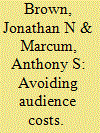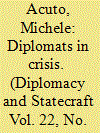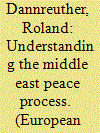| Srl | Item |
| 1 |
ID:
105849


|
|
|
| 2 |
ID:
107071


|
|
|
|
|
| Publication |
2011.
|
| Summary/Abstract |
Although "international crisis" is a widespread term, no common definition has yet been achieved: its features have neither been clarified in relation to contemporary events, nor has the role of diplomacy in relation to crises been outlined with precision. Diplomats have even become part of the problem, rather than the problem-solvers, as realist approaches have lost touch with today's poly-lateral world politics. To make up for these lacunae, this article enquires into the present-day nexus between international crisis and diplomacy by first illustrating what international crises mean beyond traditional state-centric definitions and then by considering what diplomacy can offer to tame such turbulent disruptions to the routine of world affairs. In doing so, it introduces a critical definition of international crisis and tests it in relation to a system-oriented description of diplomacy both in its routine and crisis dimensions. Outlining the role of "crisis diplomacy" beyond "diplomatic crises" the essay calls for both a novel understanding of the role of diplomats in these contexts and a greater awareness to the growing complexity of such engagements.
|
|
|
|
|
|
|
|
|
|
|
|
|
|
|
|
| 3 |
ID:
105946


|
|
|
|
|
| Publication |
2011.
|
| Summary/Abstract |
This article challenges the common assumption that the external actors involved in the Middle East Peace Process (MEPP) are driven either by neo-realist strategic competition or by the constraining power of domestic lobbies, or by a mixture of both. Such implicit assumptions are evident in the controversial argument of the power of the 'Israel lobby' as promoted by John Mearsheimer and Stephen Walt. This article argues that approaches based on such assumptions fail to explain adequately the policies adopted not only by the United States, but also by other key external actors who have been historically engaged in the MEPP - the Soviet Union and the European Union. A better explanatory framework is provided by treating the MEPP as an institution and by applying a historical institutionalist approach to the development of the MEPP, using such concepts as critical junctures, path dependence and positive feedback to analyse how the main external actors involved in the MEPP came to adopt their distinctive national approaches to the peace process. In particular, it is the responses of these actors to certain critical junctures, most notably but not exclusively to the period of the 1967 and 1973 Arab-Israeli wars, that has had a particularly strong influence on policy formulation. For the US case, the creative policymaking of Henry Kissinger during the period after the 1973 war, which was subsequently incorporated into the US conceptualization of the MEPP, provides powerful and generally unrecognized insights into the initial puzzle identified by Walt and Mearsheimer - the consistent and almost unconditional support given to Israel by the United States despite the strategic problems this creates for broader US Middle East policy.
|
|
|
|
|
|
|
|
|
|
|
|
|
|
|
|